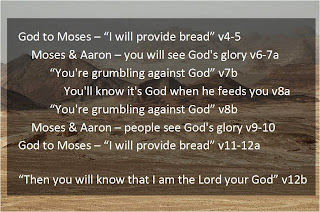handling judgement passages - a few ideas (Monday Morning Mail)
Good morning! Yesterday, we finished working through Numbers 11. In some ways the end of Numbers 11 is quite a difficult passage – we are (rightly) uncomfortable with passages about God's judgement on groups of people. After all, we understand that God is love and relates to his people with love. So this morning, I thought I'd offer three quick perspectives to help us see what the God of Love is doing in judgement passages like Numbers 11. 1. God judges the worst offenders to give the rest of the people a chance When we read stories like Numbers 11, it's important to remember their place in the bigger story of God and Israel, and in the bigger story still of God and the whole human race. In the story of God and Israel, God is leading Israel through the desert towards the Promised Land, and they're probably only a month away by this stage – they reach the edge of the Promised Land in chapter 13. Before they get there, they need to learn to trust ...
